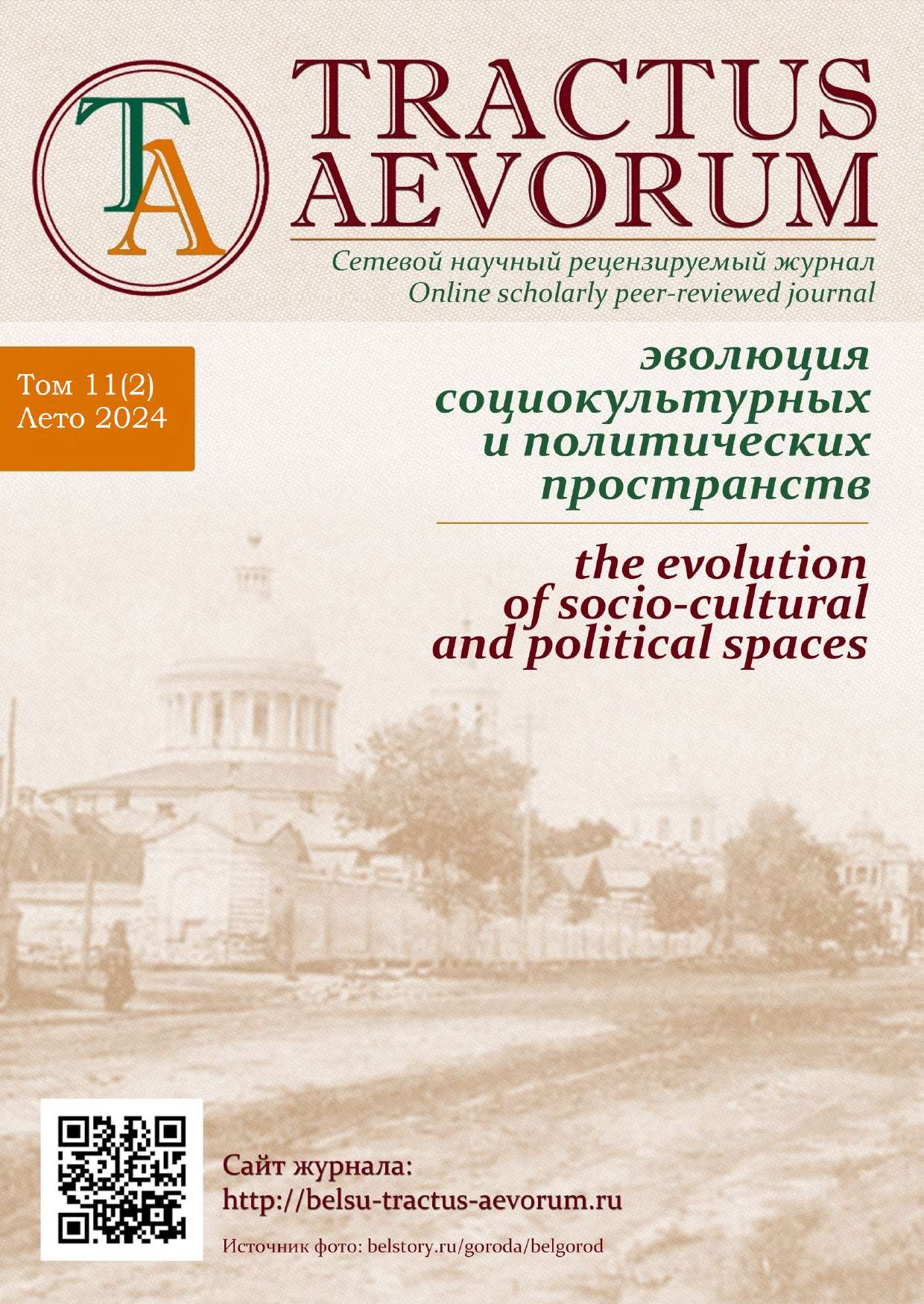|
FAMILY AND FAMILY VALUES IN HISTORICAL RETROSPECTIVE
|
Parenting in Late Antique Society (Based on the Writings of Ausonius)
|
  |
Original article
Aleksandra V. Timchenko
Belgorod State National Research University
14 Studencheskaya st., Belgorod, 308007, Russia
E-mail:
This e-mail address is being protected from spambots. You need JavaScript enabled to view it
Abstract. The article explores the autobiography of the 4th-century poet Ausonius, as well as the issue of the relationships between parents and children, and between spouses. The views of the rhetorician on family values, parental responsibilities towards children, child-rearing and education, as well as their social status, are analyzed in the article. The author concludes that Ausonius considered the life path of a person as a sequence of stages, each of which includes unique challenges and difficulties. Assessing the role of the family in formation of personality, he notes that the upbringing and education of children required direct involvement and attention from the parents.
Keywords: Late Antiquity, Ausonius, parenthood, motherhood, fatherhood, childhood, family, marriage, children, spouses.
DOI: 10.18413/2312-3044-2024-11-2-108-117
|
Application of Types of Punishments for the Murder of a Spouse in the Second Half of the 19th – Early 20th Centuries (Based on Materials from the Tver, Yaroslavl and Tobolsk Provinces)
|
  |
Original article
Aleksandra V. Spichak
Nizhnevartovsk State University
3B Mira st., Nizhnevartovsk, 628616, Russia
E-mail:
This e-mail address is being protected from spambots. You need JavaScript enabled to view it
Olesja V. Vanyushina
Research Institute of Information Technologies of the Federal Penitentiary Service
17 Vagzhanova st., 170000, Tver, Russia
E-mail:
This e-mail address is being protected from spambots. You need JavaScript enabled to view it
Julija A. Krivosheeva
Yaroslavl State University named after. P.G. Demidova
14 Sovetskaya st., Yaroslavl, 150003, Russia
E-mail:
This e-mail address is being protected from spambots. You need JavaScript enabled to view it
Abstract. The article is devoted to the study of law enforcement practice in criminal cases of crimes directed against the life of one of the spouses in families of the Tver, Yaroslavl and Tobolsk provinces in the second half of the 19th – early 20th centuries. The authors examine the class affiliation of the parties, the authorities in which cases of murder of wives and husbands were considered, the causes of the crimes. Particular attention is paid to the analysis of legislation on various types of murders: intentional and accidental, intentional and vice versa, committed in a fight, in conspiracy, due to a painful state of mind and intoxication, due to light and severe beatings, poisoning. Both gender motives have been identified: male – jealousy (“severe insult from the murdered person”), female – the desire to avoid the threat of deprivation of life, and general – the intention to get rid of the obstacle to entering into a new marriage if the killer has a lover, hatred of spouse. The authors highlight aggravating and mitigating circumstances of crimes committed by spouses, as well as the existing methods to help avoid punishment.
Keywords: murder, spouses, crime, punishment, legislation, resolution of cases, Tver, Yaroslavl and Tobolsk provinces.
Acknowledgments: The article was prepared with the financial support of the Russian Science Foundation (project No. 22-78-10103 “Marital conflicts, methods of their resolution and prevention in the second half of the 19th – early 20th centuries (interregional study)”, https://www.rscf.ru/project/22-78-10103/).
DOI: 10.18413/2312-3044-2024-11-2-118-141
EMPIRE AND PERIPHERY
|
Military Campaigns of Barbarians in Transcaucasia and the Bosporus in 395 in the Light of Modern Research on the History of the European Huns
|
  |
Original article
Artem A. Vnukov
Leo Tolstoy Tula State Pedagogical University
125 Lenin av., Tula, 300026, Russia
E-mail:
This e-mail address is being protected from spambots. You need JavaScript enabled to view it
Abstract. In 395, according to the evidence of late antique authors, the Huns raided the eastern provinces of the Roman Empire in Transcaucasia. In the domestic historiography there is an opinion that during this raid a part of the nomads separated from the main "horde" and invaded the territories of the Bosporan kingdom, as a result of which the Bosporus (Late Antique Panticapaeum) suffered. In this article, based on the analysis of written sources and archaeological material discovered during field research in the Northern Black Sea region and the Upper Don region, the author determines the tribal affiliation of the nomads of Hunnish time, who made this rapid raid. According to his interpretation, the campaign to Transcaucasia should be associated with the Akatsirs, who were not inferior in military power to the "royal" Huns. Regarding the devastation of Panticapaeum, the author notes that the city could have suffered in the course of the established trade and economic contacts of the Bosporan kingdom with the nomads, as periodic raids and the policy of distant exploitation by the steppes were more profitable for ordinary nomads than trade. However, as the author notes, this reconstruction of the course of events can be finally confirmed only by further archaeological research in the Azov steppe, careful analysis of material sources found in the territories under the control of the Akatsirs and research in the western ethno-contact zone of the Bosporan kingdom, where organized border fairs could be located in the late 4th - early 5th centuries.
Keywords: Eastern Roman Empire, Bosporan Kingdom, Huns, Akatsirs, Transcaucasia, trade, military conflicts, nomadic raids.
Acknowledgments: The study was carried out at the expense of a grant from the Russian Science Foundation 23-28-01665 "Ethnocultural interaction in the ethnocontact zone of the Eastern Crimea in the first half of the I millennium AD."
DOI: 10.18413/2312-3044-2024-11-2-142-152
|
Resettlement of Peasant Serfs from the Black Earth Villages of the Naryshkin Nobles to the Shatsky Region in the First Quarter of the 18th Century
|
  |
Original article
Denis A. Lyapin
Bunin Yelets State University
28 Kommunarov st., Yelets, Russia
Belgorod State National Research University
85 st. Pobeda, 308015, Belgorod, Russia
E-mail:
This e-mail address is being protected from spambots. You need JavaScript enabled to view it
Abstract. The author explores the features of the process of resettlement of peasant serfs and nobles Naryshkins in Shatsky district in 1704-1720. Relocations were carried out from black earth villages located along the left bank of the Tsna River to the Meshchera forests area. Based on archival materials, the process of relocation of peasant families is shown, the gender and age structure of the migrants is analyzed. Statistics indicate that they occurred annually over a long period of time. It is concluded that the black earth part of the Shatsk district at the beginning of the 18th century was well enough developed to become the basis for the economic colonization of the forest zone of this region.
Keywords: peasant serfs, Shatsk region, Naryshkins, economic development, black soils.
Acknowledgments: The study was supported by a grant from the Russian Science Foundation (project No. 24-68-00011, https://rscf.ru/project/24-68-00011/) on the basis of the Federal State Budgetary Educational Institution of Higher Education "Bunin Yelets State University".
DOI: 10.18413/2312-3044-2024-11-2-153-164
INTELLECTUAL HISTORY
|
Formation and Development of the Psychiatric Clinic of Voronezh State University in the 1920s
|
  |
Original article
Viktor V. Bakhtin
Voronezh State Medical University named after. N.N. Burdenko of the Ministry of Health of the Russian Federation
10 Studencheskaya st., 394036, Voronezh, Russia
E-mail:
This e-mail address is being protected from spambots. You need JavaScript enabled to view it
Anastasia V. Bakhtina
Voronezh State University
1 Universitetskaya sq., 394018, Voronezh, Russia
Abstract. The article examines the evolution of the psychiatric clinic of Voronezh State University (VSU) from the evacuation of Dorpat University to Voronezh until the reorganization of VSU in 1930 and the creation of an independent Voronezh Medical Institute on the basis of the Faculty of Medicine. A brief analysis of the activities of the heads of the Yuryevsky (Derpsky) clinic and Voronezh universities is given.
Keywords: medicine, psychiatry, health, education, medical figures.
DOI: 10.18413/2312-3044-2024-11-2-165-174
|
The Socio-Cultural Aspect of the Development of Soviet Cosmonautics: Modern Historography
|
  |
Original article
Eugene I. Loginov
Orenburg State Pedagogical University
19 Sovetskaya st., Orenburg, Russia
E-mail:
This e-mail address is being protected from spambots. You need JavaScript enabled to view it
Abstract. The article is a historiographical review of the works of modern researchers whose studies are devoted to the socio-cultural aspect of the development of Soviet cosmonautics. Analyzing domestic and foreign works of recent years, several topics are highlighted, which the authors usually focus on. An attempt is being made to develop and rethink knowledge about the history of Soviet cosmonautics.
Keywords: space exploration in the USSR, Soviet mass culture, cosmonautics as a cultural phenomenon, K.E. Tsiolkovsky, S.P. Korolev.
DOI: 10.18413/2312-3044-2024-11-2-175-184
DEPOSITORY
|
Political Eschatology and the French Revolution: bibliographical review
|
  |
Bibliographical review
Tony Rocchi
Independent researcher
Toronto, Canada
E-mail:
This e-mail address is being protected from spambots. You need JavaScript enabled to view it
Abstract. Eschatology is a religious doctrine about the coming end of the world and the coming of a new age. Beginning with the French Revolution, eschatology acquired a political content. This review article features a recommended bibliography of academic works about the French Revolution and other revolutions between 1768-1815. The bibliographical list is divided into thematical groups and contains the author’s commentaries thus allowing those interested in the topic to easily navigate through the suggested literature.
Keywords: French Revolution, European revolutions, political eschatology, Christian eschatology.
DOI: 10.18413/2312-3044-2024-11-2-185-189
|



